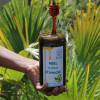alkalinizing foods
After oxidation, they give an alkaline residue, i.e., that they contain a large proportion of alkalinizing elements (sodium, calcium, magnesium, potassium).
These are vegetables in general and some fruits:
- all green vegetables (except oseille, rhubarb and bette).
- all coloured vegetables (carrot, beet, etc.). except for the tomato.
- Almond, sesame, beret nuts, chestnut.
- dried fruit (datte, raisins, dried fig), except apricot.
- melon, watermelon, banana.
- potato.
acidifying foods
after oxidation, they give an acid residue that includes a large proportion of acidifying elements (sulphur, phosphorus and chlorine, iodine).
are concerned:
- meat, poultry, charcuterie, fish, meat extracts, eggs, cheese (strong cheeses are more acidic than sweet), dairy products rich in small milk (yourt, curd milk, white cheese, kefir).
- animal fats, hardened or refined oils, whole or ungrained cereals (wheat, oat, rye, etc.). bread, pasta, flakes and cereal-based foods, legumes ( peanuts, soybeans, white beans, beans).
- refined and white sugars, sweets, syrups, industrial drinks, lemonades, sodas, pastries, candy, jams, candied fruits, coffee, tea, cocoa, wine, vinegar and mustard.
acid food or SEMI-ACIDES
they easily recognize themselves to flavor. These are lemons, grapefruits, oranges, apples, cherries, plums, apricots, thickets, blackcurrants, raspberries, fruit juices, lemon juice in the salad sauce, acidic vegetables (such as tomato, rhubarb, oseille, cresson, honey, etc.), they have a variable acidifying or alkaliating action depending on the person who consumes them.
Indeed, in the case of naturally acidic foods that have not undergone industrial transformation, the organism, after oxidizing citric, malic, tartric, ascorbic, lactic, quinic acids, in the form of carbon and water oxides, will be able to recover the alkali minerals of these foods (calcium, potassium, sodium, etc.). and thus mineralize thanks to these products.
But in the case of people suffering from metabolic and enzyme weakness, from which will result a low capacity for the combustion and oxidation of acids, the acids will be stored and will contribute to the acidification of orgonism.
This difficulty of the organism to neutralize acids can be expressed by frilosity, excessive nervousness, hyperemotivity, a depressive tendency, fatigue associated with a lack of chronic energy, the weakness of the immune system, a longilign physiognomy and in general, a great paler due to the contraction of the capillaries, (the hemoglobin rate being normal), headaches,
Dairy is a source of calcium but is, apart from raw fresh milk, acidifying foods. as detailed in the studies of the School of Harvard, of which the journalist thierry souccar speaks; paradoxically, it is in countries where the highest levels of fractures are consumed, such as suede. The bone needs calcium and vitamin d, but also and especially an acid-basic balance brought by the diet. It is not a matter of radically excluding dairy products but of encouraging their moderate consumption.
The majority of foods that make up fast-food sandwiches and burgers, apart from the salad leaf, are acidifying foods that do not respect the notion of acid-base balance so important to the body. Indeed, in order to promote the mineral balance of the body and the ossification of the young child, it is not enough to promote only the consumption of calcium evaporators.
This being said, the fast-food food pattern can be widely reproduced outside these restaurants. whether at home, with friends or anywhere.
some studies show a three to five-fold increase in fractures in adolescents who regularly consume acid beverages (soft drinks; cf article de la revue nutranews).
about the sodas that can be found in fast-food menus, and according to an American study relatted by the magazine “that choosing health”, it was established that women consuming more than one soda can of a day have less bone strength. The author Katherine l. tucker, a researcher at the Tuft University of boston, explains that the harmful role of sodas on bones had already been suspected.
Indeed, it had been observed that adolescents who were drinking many colas had an increased risk of fracture. but this fragility was explained by the fact that the consumption of these sodas took place at the expense of other calcium-rich beverages and promoting bone solidity. This interpretation is no longer valid here: even with equal calcium intakes, high consumption of colas has been associated with a less solid bone. researchers suspect here, phosphoric acid, present in the colas, to promote the fragility of the bones. studies are under way to support this phenomenon.
in vitro experiments indicate that metabolic acidosis causes a release of calcium by bones which, originally, is simply due to a physico-chemical dissolution of the mineral. On a more chronic basis, metabolic acidosis alters the functioning of bone cells: it causes an increase in osteoclastic bone resorption (defence of bone density) and a decrease in osteoablastic bone formation. (idem: loss of bone density)
acid industrial beverages, in many cases contribute to the demineralization of the body. in children it promotes weakening of bones. and in the long term, it will participate in the process leading to osteoporosis.
By demonstrating observation and vigilance on everything we absorb on a daily basis (solid and liquid food), we can consciously promote the acid-basic balance of our body, which will prevent us from many more or less significant health disorders.
information about the author.
ericdarche/ Naturopath-hygienist, author of 9 works
creator of a school of naturopathy and hygienicism in E-learning:enhed
Author, lecturer. Consult remotely by tel or skype.
tel: 09 50 24 05 34.
www.ericdarche.com
Facebook group:naturopathy, hygienist and living diet.






